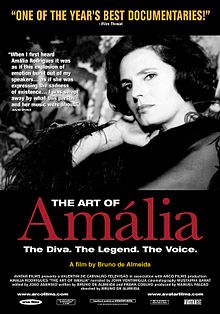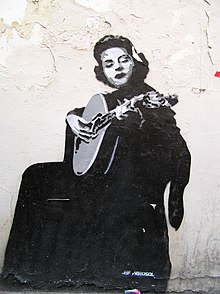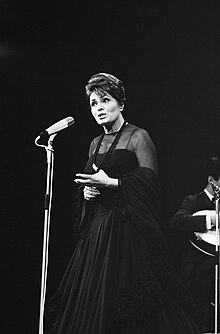Amália Rodrigues
Amália Rodrigues (pronunciation: [ɐ'mali̯ɐ ʀu'drigɪʃ] ), with full name Amália da Piedade Rebordão Rodrigues (born July 23, 1920 in Lisbon ; † October 6, 1999 ibid), was probably the most important Fado singer. She is also known as the "Queen of Fados". Although made already Ercília Costa (1902-1985) Fado known internationally, but Amália coined its international distribution until today like no one else.
She also appeared as an actress in a number of works, mostly in Portuguese cinema , with which she celebrated great audiences particularly in 1947. However, the film reviews failed to convince them as much as they did in the music world.
Life
Rodrigues was one of ten children of a poor family from Fundão and was born in Lisbon , where the family had meanwhile moved. As a young girl, she had to help sell fruit in the docks of Alcântara . Her younger sister Celeste also sang fado , practically until her death in 2018.
In 1940 Rodrigues married the amateur guitarist Francisco da Cruz, from whom she divorced in 1943 at her own request. It was not until 1961 that she married again, the Brazilian engineer César Seabra, with whom she was married until his death in 1997.
In 1939 she began her career as a fado singer in the Retiro da Severa nightclub . In 1944 and 1945 she toured to Brazil , where her first recordings took place. In the following decades she made countless records (the number is estimated at over 170) and appeared in about a dozen films. She toured all over the world.
Her international breakthrough came with the song Coimbra , which as Avril au Portugal and then as April in Portugal had worldwide success since the 1950s. The song, written by Raul Ferrao in the late 1930s, is one of the world's most popular Portuguese-language songs with over 200 recordings (only Tom Jobim's Garota de Ipanema has more versions than The Girl from Ipanema ). In her first acting role in the film Capas negras (1947) this song was not sung by Rodrigues, but, according to the plot, by her film partner Alberto Ribeiro. The film became the most successful Portuguese film to date , which contributed to the popularity of the song.
On a European tour as part of a cultural project of the Marshall Plan in 1950, the French singer Yvette Giraud asked Rodrigues, who was also participating in the tour, in Dublin for a few of her favorite songs so that she could sing them with French lyrics. From Coimbra was so Avril au Portugal . Giraud's success in Paris and London made the song famous. In 1955, the Portuguese state propaganda department had the film April produced in Portugal , in which Rodrigues sang the same song. The film premiered at the Royal Film Performance in London, became very popular and won awards at the Berlin and Mar del Plata film festivals. Rodrigues then sang the song in various languages and performed with it worldwide.
The international success led to several international tours and numerous television appearances around the world. In 1967 she was awarded the MIDEM Prize in Cannes . She recorded with artists such as Don Byas or Vinícius de Moraes . The internationally increasingly isolated Portuguese regime Estado Novo tried to use Rodrigues' popularity for itself and to present her as Portugal's ambassador in the world.
Her apolitical stance under the Salazar dictatorship was often held against her, even if she often worked with declared opponents of the regime, for example with the communist Ary dos Santos or Alain Oulman (who, arrested by the secret police PIDE , could only go into exile in Paris through massive intervention by Amalia where she met him frequently). She later recorded a version of the “hymn” of the Carnation Revolution , Grândola, Vila Morena , while her Fado Povo que lavas no rio (people who wash in the river) gained a critical rating early on and her Fado de Peniche was banned (In Peniche , the dictatorship maintained a political prison ). Her tour of the Soviet Union also did not fit in with the regime's anti-communism.
She had her last public appearance at the world exhibition Expo 98 as part of an honor for her.
Aftermath
On the occasion of her death in October 1999, then Prime Minister António Guterres declared a three-day state mourning , the current election campaign was discontinued. She was buried in the Prazeres cemetery while hundreds of thousands said goodbye along the funeral march. In 2001, her remains were transferred to the Lisbon Pantheon in the Santa Engrácia Church , an honor she was the first and only woman to date. A change in the law was necessary for this, as originally someone could not be transferred to the national pantheon until four years after death at the earliest. However, due to massive public pressure to immediately admit Amalia Rodrigues to the national shrine, the transfer was made possible as early as 2001 by the change in the law.
In Lisbon's Rua de São Bento (unofficially also known as "Rua Amália"), the Museu Fundação Amália Rodrigues museum is dedicated to her in her former living quarters . Her life and music are the subject of the musical Amália , successfully produced by Filipe La Féria and premiered in 2002.
She did not live to see the completion of the multilingual documentary A arte de Amália by director Bruno de Almeida , in which she still participated with interviews. The premiere took place in December 2000 at Quad Cinema in New York. The film has been released on DVD in various editions, with English, French, Spanish and Portuguese soundtracks, recorded by Hollywood actors Maria de Medeiros , Joaquim de Almeida and John Ventimiglia and an introduction by David Byrne, who is completely devoted to Amalia . In 2008, the biopic Amália by Carlos Coelho da Silva was a film adaptation of her life in the cinema, which was also successful on DVD. In 2006/07, the fado singer Maria de Fátima toured the Netherlands , who had performed as a teenager with Amália Rodrigues, with a show that was reminiscent of the life of the great singer.
A project called " Hoje " (German: today) from well-known Portuguese musicians such as the singer of The Gift or the Moonspell singer recorded sales records in 2009 and 2010 with an album and a suitable tour called Amalia hoje , in which she performed well-known songs from Rodrigues 'Reinterpreted repertoire. Already in 2005 there was a tribute sampler called Amália revisited in Portugal with versions of defining Rodrigues songs, interpreted by bands and projects from hip-hop , NuSoul and other new dance music in the broadest sense.
In 2010 the Amalia-Rodrigues-Weg was inaugurated with a festival in Hamburg and a memorial plaque for the singer, her significance for Fado and the five million Portuguese abroad.
Honors
- 1959: Médaille de l'honneur of the City of Paris
- 1968: First award of the highest Spanish award, the Orden de Isabel la Católica
- 1971: Cedar Order of the State of Lebanon
- 1980: Abecassis Cross of the City of Lisbon
- 1981: Grand Officer of the Order of Infante Dom Henrique , presented by President Mário Soares
- 1989: Commandeur des Ordre des Arts et des Lettres , presented by the French Minister of Culture, Jack Lang
- 1990: Médaille de Vermeil of the City of Paris , presented by Mayor Jacques Chirac
- 1990: Grand Cross of the Order de Isabel la Católica
- 1990: Grand Cross of the Order of St. Jacob of the Sword , presented by President Mario Soares
- 1990: Order of the Legion of Honor , presented by President François Mitterrand
various medals of honor in Lisbon, Porto, Paris, Tokyo, Rio de Janeiro, Beirut, Tel Aviv, Madrid, New York etc. a.
Rodrigues in the film
Films about Amália Rodrigues

Amália's life has been filmed several times. Thus produced Bruno de Almeida four films about Amalia:
- Amália, Live in New York City (a recording of a gig in New York City Hall in 1990)
- Amália - uma estranha forma de vida (a documentary over 5 hours in the form of a series)
- Amália - Expo'98 (on the occasion of the world exhibition Expo 98 in Lisbon, where Amália had her last major public appearance)
- A Arte de Amália (a 90-minute documentary also for the international audience, which was shown worldwide from 2000 and then released on DVD)
In 2008 the filmmaker Carlos Coelho da Silva produced a biographical film about the diva called Amália . This film is based on the hugely successful musical of the same name by director Filipe La Féria , which ran for six years at the Teatro Politeama in Lisbon . The film was u. a. Funded by the RTP (Portuguese Public Service Television) and the Portuguese Film Promotion Institute Instituto do Cinema e do Audiovisual (ICA). Amália was portrayed by the actress Sandra Barata Belo. The film was then also released on DVD.
Films with Amália Rodrigues
Amália Rodrigues also appeared in films herself, both as an actress and in documentaries about Fado in general or about her person in particular.
She had her first role, already as a popular fado singer, in the film Capas Negras , a love drama set in the student city of Coimbra . The film by director Armando de Miranda premiered on May 16, 1947 at the Cinema Condes in Lisbon and was an enormous success, not least thanks to some fados such as Coimbra É Uma Lição or Feiticeira . Also Fado, História d'uma Cantadeira , the same year directed by Perdigão Queiroga emerged, was a great success. At the side of the heartbreaker and later internationally successful actor Virgílio Teixeira and with the two popular comic actors António Silva and Vasco Santana , the film with its problematic success story of a fado singer rising from a poor background suggests a closeness to Amália's life.
Later she tried herself in demanding roles, especially her acting role in As Ilhas Encantadas (1964, directed by Carlos Vilardebó ), with which she wanted to get closer to the New Portuguese Film . However, neither the film nor her role found any resonance among filmmakers.
Discography (selection)
Her first recordings were made in Brazil in 1945. After an unknown number of shellac records, there followed a large number of records in various countries, which can hardly be quantified . Collectors estimate their number at well over 700. José Moças, founder of the renowned Tradisom label and well-known record collector in Portugal, puts the number of Amálias record releases known to him at 837 worldwide.
A selection of publications is listed in chronological order:
- Perseguição , 1945
- Tendinha , 1945
- Fado do Ciúme , 1945
- Ai Mouraria , 1945
- Maria da Cruz , 1945
- Ai Mouraria , 1951/52
- Sabe-se Lá , 1951/52
- Novo Fado da Severa , 1953
- Uma Casa Portuguesa , 1953
- Primavera , 1954
- Tudo Isto é Fado , 1955
- Foi Deus , 1956
- Amália no Olympia , 1957
- Povo que Lavas no Rio , 1963
- Estranha Forma de Vida , 1964
- Amália Canta Luís de Camões , 1965
- Formiga Bossa Nossa , 1969
- Amália e Vinicius , 1970
- Com que Voz , 1970
- Fado Português , 1970
- Oiça Lá ó Senhor Vinho , 1971
- Amália no Japão , 1971
- Cheira a Lisboa , 1972
- Amália no Canecão , 1976
- Cantigas da Boa Gente , 1976
- Lágrima , 1983
- Amália na Broadway , 1984
- O Melhor de Amália - Estranha Forma de Vida , 1985
- O Melhor de Amália volume 2 - Tudo Isto é Fado , 1985
- Obsessão , 1990
- Abbey Road 1952 , 1992
- Segredo , 1997
Filmography
- Capas Negras (POR 1947, directed by Armando de Miranda )
- Fado, História d'uma Cantadeira (POR 1947, directed by Perdigão Queiroga )
- Ten short films (now called video clips ) on the titles Fado da Rua do Sol , Fado Malhoa , Fado Amália , Fado Lamentos , O Meu Amor na Vida (Confesso) , Só à Noitinha , Ronda dos Bairros , Eu Disse Adeus à Casinha , Fado Mouraria (Mouraria) , Fado Lisboa (Ai, Lisboa) (POR 1947, directed by Perdigão Queiroga)
- Sol & Touros (POR 1949, directed by José Buchs )
- Vendaval Maravilhoso (POR / BRA 1949, directed by José Leitão de Barros )
- Nights in Lisbon ( Les Amants du Tage , FR 1954, directed by Henri Verneuil )
- April in Portugal (GB 1955, short film, director: Euan Lloyd )
- Musica de Siempre (MEX 1955, directed by Tito Davison )
- Las Canciones Unidas (MEX 1957, directed by Tito Davison)
- Sangue Toureiro (POR 1958, directed by Augusto Fraga )
- Fado Corrido (POR 1964, directed by Jorge Brum do Canto )
- As Ilhas Encantadas (POR 1964, directed by Carlos Vilardebó )
- Via Macau (FR / POR 1966, director: Jean Leduc )
literature
Own works
- Amália Rodrigues: Versos. Cotovia, Lisbon 1999, ISBN 978-972-802-888-6 .
Secondary literature
- Jorge Leitão Ramos : Dicionário do cinema portugués 1962–1988. Editorial Caminho , Lisbon 1989, ISBN 972-21-0446-2 (p. 340 f.)
- Vitor Pavão dos Santos: Amália - Uma estranho forma de vida. Editorial Verbo, Lisbon 1992, ISBN 972-22-1505-1 .
- Various authors: Coimbra - April in Portugal - Avril au Portugal. CD + book. Tradisom , Trad038 2004.
- Rui Martins Ferreira: Amália - a divina voz dos poetas e de Portugal. Parceria AMPereira, Lisbon 2008, ISBN 978-972-864-561-8 .
- Cristina Faria: Fotobiografias século XX: Amália Rodrigues. Temas & Debates, Lisbon 2008, ISBN 978-989-644-032-9 .
- Tiago Baptista: Ver Amália - Os Filmes de Amália Rodrigues. Tinta da China, Lisbon 2009, ISBN 978-989-671-012-5 .
- Estrela Carvas: Os meus 30 anos com Amália. Guerra & Paz, Lisbon 2009, ISBN 978-989-817-434-5 .
- José Alberto Sardinha: A origem do Fado. Tradisom, Vila Verde 2010, ISBN 978-972-8644-13-0 (p. 166 ff.).
- Salwa Castelo-Branco: Enciclopédia da música em Portugal no século XX, P – Z. Temas & Debates / Círculo de Leitores , Lisbon 2010, ISBN 978-972-42-4598-0 (p. 1132 ff.).
- Alcides Murtinheira, Igor Metzeltin: History of Portuguese Cinema. Praesens Verlag , Vienna 2010, ISBN 978-3-7069-0590-9 .
- Jorge Leitão Ramos: Dicionário do cinema portugués 1895–1961. Editorial Caminho, Lisbon 2012, ISBN 978-972-21-2602-1 (p. 364 f.).
Web links
- Amalia Rodrigues in the Internet Movie Database (English)
- Private Page (Portuguese)
- Page of the magazine Matices (German)
- Private Page (Portuguese)
- Website of the Portuguese-Hanseatic Society with biography and films
- List of all streets / squares named after Amália (German)
Individual evidence
- ↑ Event notice ( page no longer available , search in web archives ) Info: The link was automatically marked as defective. Please check the link according to the instructions and then remove this notice. in the Portugallierforum, accessed on October 15, 2013.
- ^ Jorge Leitão Ramos : Dicionário do Cinema Português. 1962-1988. Editorial Caminho , Lisbon 2012 ( ISBN 972-21-0446-2 ). P. 341
- ↑ Statements by José Moças and other collectors in the Portuguese documentary Powdered Music / Música em Pó , Eduardo Morais, Portugal 2015 , from the 17th minute, YouTube access on June 8, 2019
| personal data | |
|---|---|
| SURNAME | Rodrigues, Amália |
| BRIEF DESCRIPTION | Portuguese fado singer |
| DATE OF BIRTH | July 23, 1920 |
| PLACE OF BIRTH | Lisbon |
| DATE OF DEATH | October 6, 1999 |
| Place of death | Lisbon |




